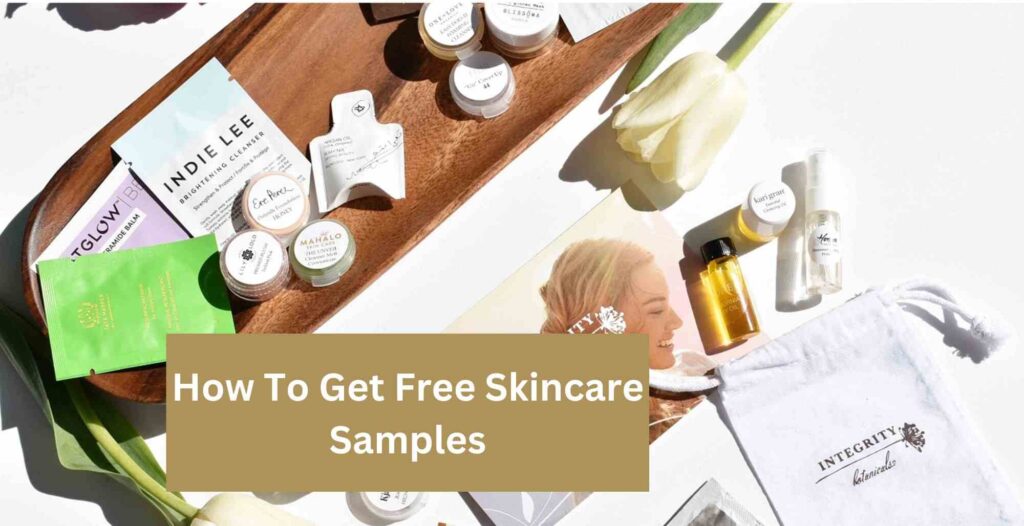Learn how to rank the issues that pertain to your skin in order of importance while selecting the right products. Discover the fundamentals that will guide your decision-making regarding your skin, from skin type and particular issues to the effectiveness of active ingredients.
The following advice will help you make well-informed decisions about your skin type, seasonal routine adjustments, and aging-related changes.
Table of Contents:
Understanding Your Skin Type and Concerns – A Comprehensive Guide!
Knowing your skin type and issues is the first step in the process. Ascertaining your skin type—normal, oily, dry, combination, or sensitive—will help you choose the appropriate products.
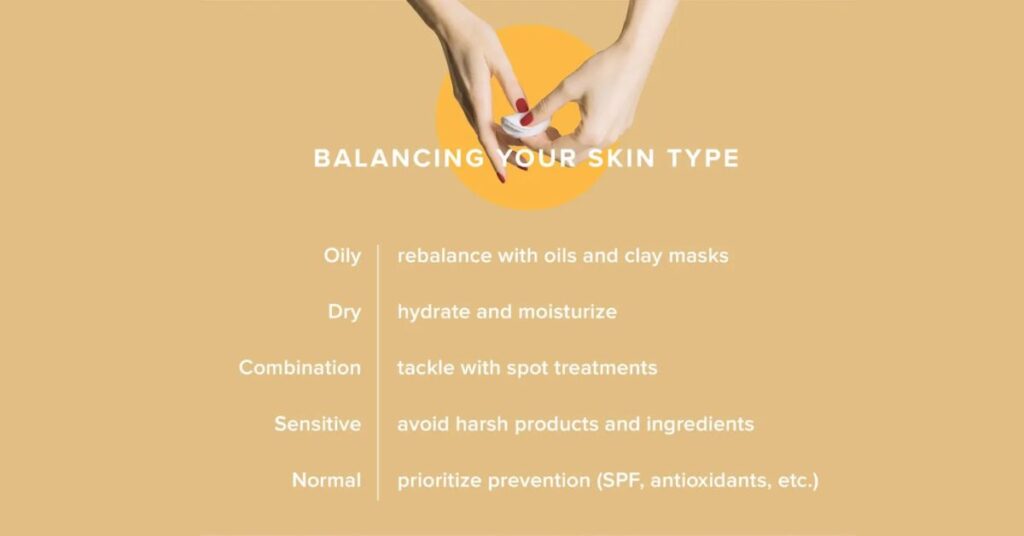
For instance, dry skin would require richer, more moisturizing formulas, while oily skin would prefer to stay with lightweight, oil-free products. Next, think about the specific issues you are facing with your skin: dryness, redness, hyperpigmentation, aging, or acne.
Follow your routine to combat these issues: use a serum to target pigmentation or ageing, use an exfoliator for better texture and acne, and gently cleanse for dry or sensitive skin. Remember to use sunscreen as well to avoid UV damage.
Before using any new products, always do a patch test to rule out any bad reactions. See a dermatologist if issues continue. Your skin type may vary over time, so it’s important to occasionally reevaluate it to keep your skincare regimen tailored and on target.
Identifying Common Skin Concerns
- Dry Skin: Dry skin frequently has a flaky, itchy, or tight feeling. This happens when there is not enough moisture in the skin, which may feel rough to the touch. In contrast to dehydrated skin, dry skin usually has lower levels of natural oils and needs richer, more emollient moisturizers to be hydrated and comfortable.
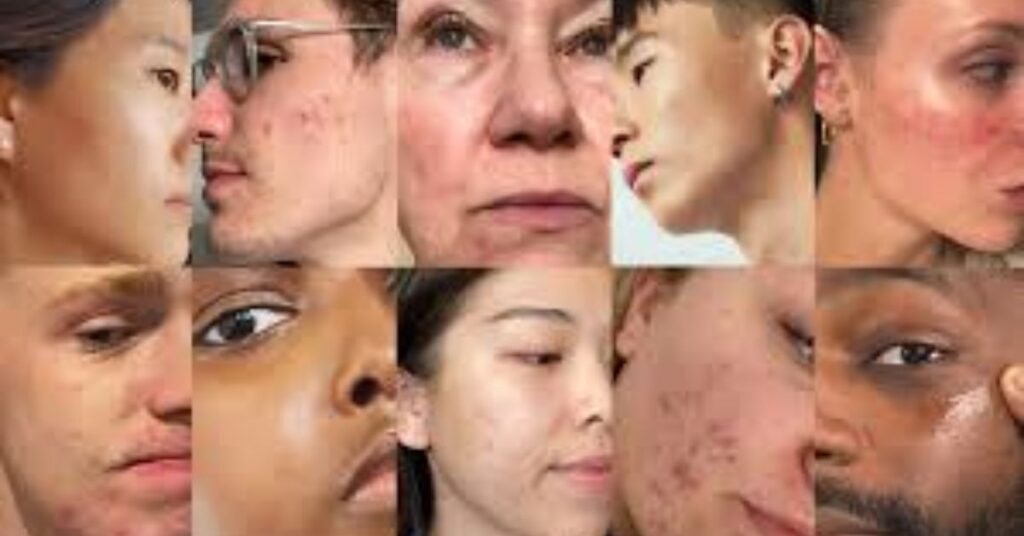
- Dehydrated Skin: Compared to oily skin, dehydrated skin is a transient state in which the skin is deficient in water. It may feel tight or dry and look drab. Dehydration can affect any skin type, including dry and oily skin, and is frequently caused by outside factors like the environment or inadequate water consumption.
- Uneven Skin Tone: Frequently brought on by sun damage, hormone fluctuations, or acne scars, an uneven skin tone is characterized by discoloration or dark blotches. These patches can take away from a flawless, glowing complexion by causing a lack of uniformity in the color of the skin.
- Redness: Skin redness can be caused by some things, such as inflammation, irritation, or skin conditions like rosacea. It appears as obvious redness or flushing, and it could also be accompanied by sensitive or warm feelings.
- Dullness: The inherent brightness and brilliance that are usually associated with good skin are absent from dull skin. This may be brought on by an accumulation of dead skin cells, impaired blood flow, or environmental harm. Skin that is dull-looking tends to appear more fatigued and lifeless.
- Acne: Blackheads, pimples, or bumps are frequent skin conditions caused by acne. It happens when oil and dead skin cells clog hair follicles, causing inflammation and bacterial development. Acne is a common skin condition that can affect many parts of the face and body, especially during adolescence and even into maturity.
- Dark Circles: The most common causes of dark circles beneath the eyes include age, ocular strain, and sleep deprivation. They might give the appearance of fatigue or weariness and manifest as deeper pigmentation under the eyes.
- Under-Eye Puffiness: Retention of fluid, aging, heredity, or allergies are common causes of puffiness around the eyes. Underneath the eyes, there is a distinct bulge and swelling due to this illness, which can be made worse by things like sleeping too little or eating too much salt.
- Fine Lines: On the skin’s surface, fine lines are tiny, shallow creases. They appear around the mouth, forehead, and eyes and are frequently one of the earliest indications of aging. As time passes and the skin loses its suppleness and collagen, fine lines appear.
- Creping: The term “creping” describes the development of fine, wrinkle-like lines on the skin that resemble pancake paper. This occurrence is an indication of substantial loss of elasticity and moisture and frequently happens in more delicate parts of the skin, such as the neck or beneath the eyes.
Essential Skincare Ingredients to Look For
Hyaluronic Acid for Hydration
- For optimal hydration, hyaluronic acid is essential as it promotes skin plumpness and minimizes the visibility of fine lines and wrinkles.
- It is an excellent humectant, holding up to 1000 times its weight in water.
- All skin types, even sensitive skin, can benefit from hyaluronic acid.
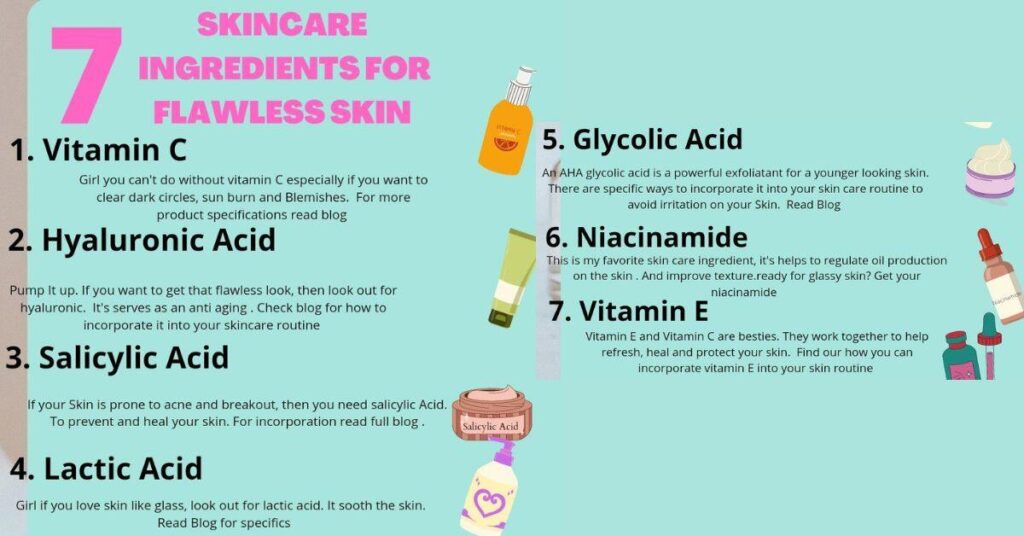
Retinoids (Retinol, Retinaldehyde) for Anti-Aging and Collagen Production
- Retinoids are highly valued for their anti-ageing characteristics and are generated from vitamin A.
- They lessen the visibility of wrinkles and fine lines and encourage skin rejuvenation.
- Retinoids can also aid in pore cleaning and acne reduction.
Vitamin C for Antioxidant and Brightening Properties
- Vitamin C is a potent antioxidant, crucial for fighting free radicals and aiding skin firming and brightening.
- It can help to reduce the appearance of fine lines and wrinkles and improve skin texture.
- Vitamin C is also essential for collagen production and can help to improve skin elasticity.
Sunscreen Ingredients (Zinc Oxide, Titanium Dioxide) for UV Protection
- The broad-spectrum protection that sunscreen chemicals provide against UVA and UVB rays helps to avert sun damage and early aging.
- Physical sunblocks such as zinc oxide and titanium dioxide prevent UV radiation by sitting on the skin’s surface.
- All skin types, even sensitive skin, can use them.
Alpha and Beta Hydroxy Acids (AHAs and BHAs) for Exfoliation and Brightening
- Exfoliants such as AHAs (glycollic and lactic acid) and BHAs (salicylic acid) work well on dry, sun-damaged skin and oily, acne-prone skin, respectively.
- They can lessen the visibility of wrinkles and fine lines and assist in improving the texture of the skin.
- Moreover, BHAs and AHAs might lessen acne and clear clogged pores.
Peptides for Collagen Production and Anti-Aging
- Short sequences of amino acids called peptides aid in the synthesis of skin-specific proteins like collagen, which are noted for their anti-aging characteristics.
- They may lessen the visibility of wrinkles and fine lines and increase the flexibility of the skin.
- Peptides can also aid in firming and improving the texture of the skin.
Niacinamide (Vitamin B3) for Skin Barrier Function and Hydration
- Niacinamide is well known for its many uses, including its ability to lessen redness, minimize the appearance of pores, control oil production, and shield the body from environmental harm.
- It may aid in enhancing the moisture and suppleness of the skin.
- Niacinamide is safe for all skin types, including the most delicate ones.
Ceramides for Skin Barrier Function and Hydration
- The lipids called ceramides help the skin retain its barrier function by preventing damaging external aggressors and retaining moisture and nutrients.
- They may aid in hydrating the skin and lessening the visibility of wrinkles and fine lines.
- Ceramides work well on all skin types, including the most sensitive ones.
Choosing Skincare Products Based on Your Skin Type and Concerns
Key Considerations for Different Skin Types:
- Dry Skin: Use only moisturizing, mild products. To prevent moisture loss, use rich moisturizers, hydrating toners, and serums with hyaluronic acid or glycerin, and creamy or oil-based cleansers. Put on moisturizing, non-greasy sunscreens to stay protected.
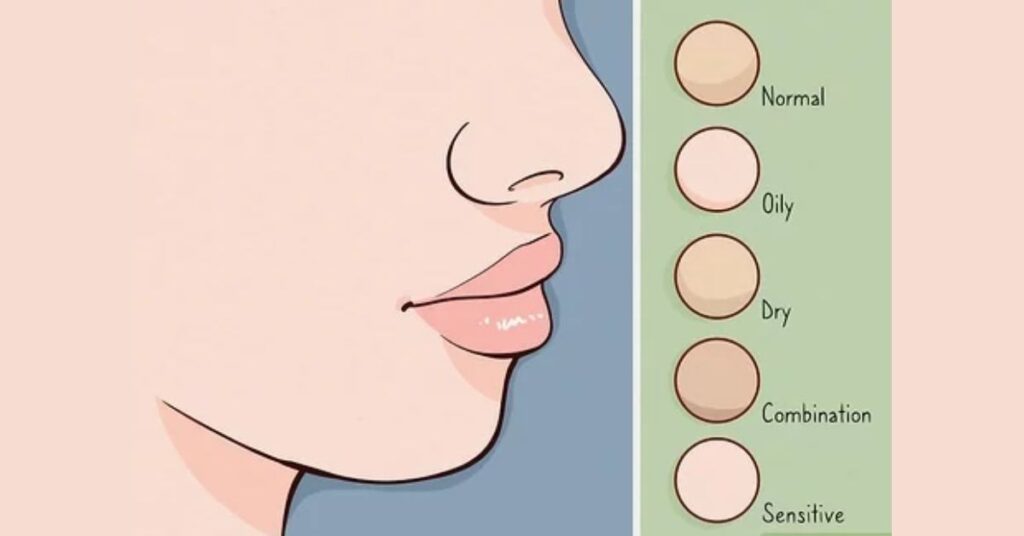
- Oily Skin: Light Activeness, oil-free products will assist in the control of shine without clogging pores. You need astringent toners, gel-based and foamy cleansers, and serums that balance the oil on your skin. Not only do mattify sunscreens and non-greasy, light moisturizers control shine, but they also protect your skin.
- Combination Skin: Products that will balance your face’s oily and dry areas are what you require. Lightweight, non-comedogenic moisturizers, moisturizing and oil-controlling toners, and gentle cleansing are all recommended. Using a non-greasy, broad-spectrum sunscreen will help keep your skin balanced.
- Sensitive Skin: Use only calming, mild products. Opt for fragrance-free, hypoallergenic cleansers and toners, as well as relaxing serums and moisturizers containing ingredients like aloe vera or chamomile. Select sunscreens that are suitable for sensitive skin types and stay away from exfoliants and active ingredients that are too strong.
Additional Tips for Choosing Skincare Products
Beyond skin type, there are other things to take into account when choosing skincare products that can improve your entire experience and outcomes. Here are some more pointers to assist you in choosing wisely:
Considering Your Lifestyle and Environment:
- Pollution and Environmental Factors: Look for products that contain antioxidants like vitamin C, vitamin E, or green tea extract if you live in an area with excessive UV radiation or pollution. These components support the prevention of free radical damage and shield your skin from outside stresses.
- Busy Lifestyle: Choose skincare products that are simple to use and fit in well with your routine if you have a busy schedule. Products that do two things well, like serums that combine hydration and anti-aging properties or moisturizers with SPF built in, can streamline your routine and save time. Seek for items that require few procedures and easy application methods.
Reading Product Labels and Ingredient Lists:
- Active Ingredients: Make sure the active ingredients listed address the particular issues you are having with your skin. For instance, search for retinoids for anti-ageing, salicylic acid for acne, and hyaluronic acid for hydration. Knowing the functions of each ingredient might assist you in choosing goods that cater to your particular requirements.
- Steer Clear of Harsh Chemicals: Products with artificial fragrances, harsh chemicals, or known irritants should be avoided. Synthetic colours, sulfates, and parabens are a few ingredients that may aggravate sensitive skin or have negative effects. If you have sensitive skin, choose products with more natural or dermatologist-tested components.
Patch Testing New Products:
- Test for Reactions: Do a patch test on a tiny section of your skin, like the inner forearm or the area behind your ear, before completely incorporating a new product into your skincare routine. This test assists in locating any possible allergies or irritants that can result in a reaction. It is advisable to avoid using the product if you notice swelling, redness, or itching.
FAQS:
1. How can I select skincare products for my acne-prone skin?
Look for products containing niacinamide, benzoyl peroxide, or salicylic acid if you have acne-prone skin. These components lessen inflammation, clear clogged pores, and regulate oil production.
2. How can seasonal changes affect my skincare routine?
Use lighter, oil-free products in the summer to control excess oil and richer, moisturizing products in the winter to battle dryness. Modify your routine according to the season.
Conclusion:
When selecting skincare products, take into account your surroundings and lifestyle, prioritise active ingredients, and be aware of your skin type and issues. To prevent any responses, thoroughly read product labels and conduct a patch test before incorporating new products into your regimen.

